VIDEOS:
Denmark: provoking the limits of tolerance
https://www.youtube.com/watch?v=7sM8p7hnprM
Why does SWEDEN NO LONGER WANT IMMIGRANTS? - VisualPolitik EN
https://www.youtube.com/watch?v=5CSUimZjiI0
Terror in Oslo
A Muslim shouting “Allahu akbar!” targets a gay bar. Bring in the psychiatrists!
Bruce Bawer is a Shillman Fellow of the David Horowitz Freedom Center.
At a quarter after one o’clock on the night before Oslo’s pride parade is scheduled to take place, a 42-year-old Iranian-born man shouts “Allahu akbar!” and starts shooting wildly and randomly at people in and around London Pub, the city’s largest gay bar. In all, he kills two people and wounds twenty-one. And within a few hours the police have a theory as to why he committed these latest barbaric acts: he has psychiatric problems.
Yes, “psychiatric problems” - the euphemism of choice for Islamic terrorism. They tried to get away with this in the case of another soldier of Allah who attacked a gay club - namely, Omar Mateen, who killed 49 people at the Pulse nightclub in Orlando just over six years ago. By contrast, when the truly insane Anders Behring Breivik (just read his “manifesto”) killed 77 people in and near Oslo in 2011, authorities did everything they could to have him ruled sane - so that they’d be able to pin his actions on critics of Islam who’d never come close to calling for violence.
The police who float the theory about “psychiatric problems” are the same police, note well, who’ve chosen to pretend that the major terror threat to Norway is posed by “right-wing extremists.” As recently as June 16, Norway’s Police Security Service (PST) stated in a press release that the likelihood that Norway would experience a terrorist act by “right-wing extremists” (which here, as in the U.S., is chiefly a left-wing establishment phantasm) during the next 18 months was 40-60%, while the likelihood of such an action by “extreme Islamists” (as opposed, presumably, to “moderate Islamists”) was under 40%.
On Saturday, the day after the atrocities, I watch the coverage on Norwegian television for several hours without hearing the word “Islam” or “Muslim” a single time. Bits of information drip out. The murderer’s name: Zaniar Matapour. He came to Norway as a refugee at age twelve. He’s a småbarsfar, which means he has one or more young children. He’s been living off of the social-welfare system for years. He has a previous conviction for a violent knife assault, served a prison sentence in 2016 for a drug offense, and was arrested in 2019 for attempted murder and gross illegal possession of a firearm - only to see the case (and a prosecutors’ appeal) dismissed. And yes, as it turns out, he’s been treated for psychiatric problems - but (to raise a question explored definitively in Jamie Glazov’s 2018 book Jihadist Psychopath) what exactly does it mean, in a Western society, to speak of the mental fitness of a Muslim who, like so many other adherents of Islam, is devout to the point of being willing to commit mass slaughter of infidels?
Oh, and he holds Norwegian citizenship. Did he acquire it, I wonder, before compiling his rap sheet, or afterward? What exactly does a violence-prone immigrant have to do to be deported? These are questions that the mainstream Norwegian media used to permit itself to ask now and then, but not so much nowadays.
Finally, at a 2 p.m. press conference, PST head Roger Berg declares the atrocity an act of “extreme Islamist terrorism.” Matapour, he explains, belongs to a network of radical would-be terrorists. He’s been on PST’s radar since at least 2015. In fact they had a sit-down with him last month, because he’d “shown interest” in statements that he’d regarded as “offenses against Islam,” but had decided he wasn’t a threat. “We can’t monitor everybody,” Berg explains.
This is the same PST that called me in several years ago, and wasted over an hour grilling me because they thought I, a writer about Islam, represented some kind of danger.
Even after the PST links the savage shootings directly to Islam, none of the gay people interviewed on the streets of Oslo about it make any reference to the Religion of Peace. And when the prime minister, Jonas Gahr Støre, goes on TV at about 3 p.m. he only mentions Islam by way of expressing concern for Norwegian Muslims, who, he says, must be “scared and despairing” in the wake of Matapour’s misdeeds, and who deserve our acknowledgment that no one other than the perpetrator himself is responsible for them. Later in the day, Masud Gharahkhani, a 39-year-old Iranian who came to Norway as a refugee and who last November was named president of Parliament - a largely ceremonial position that makes him, technically, the highest ranking individual in the country after the king himself - states that the atrocity had “nothing to do with religion.” And in a Sunday morning TV interview, parliament member Abid Q. Raja, who before entering politics was the spokesman for a mosque, tries to play down Islamic hatred for gays by saying that Norwegian Christians have their prejudices, too.
I also read reports connecting Matapour to Arfan Bhatti, a leader of the Norway-based Profetens Ummah movement who has recruited on behalf of ISIS and who, on July 14, posted on Facebook a picture of a burning rainbow flag along with a hadith - i.e., a saying of Muhammed - calling for the murder of homosexuals. (In the course of all this reading, incidentally, I discover that Karianne Solbrække, who since 2016 has been news editor of Norway’s leading privately owned television channel, TV2, was once Bhatti’s mistress.)
A personal note. London Pub used to be my regular watering hole. It’s a rambling, slightly musty, basement-level space with a dark, cozy feel and large framed pictures on the wall of Oscar Wilde, Dirk Bogarde, Ian McKellen, Jean-Paul Gaultier, and other famous gays. It was there that I met, over twenty years ago, most of the people who would become my best friends in Oslo. It was the place where, on 9/11, my fellow patrons queued up to give me, the American expatriate, hugs of condolence and solidarity. And it’s still the place that I drop into whenever I’m in Oslo. It’s no longer, for me, a place where everybody knows my name, to quote the theme song from Cheers, but it’s still a place where there’s almost always a familiar face.
It’s also a place that’s been an oasis of friendly faces in a city that, for gay people, has become increasingly unfriendly. I’ve written previously about the several occasions on which my partner and I were attacked on the streets of Oslo by Muslims who appeared to have gone berserk at the mere sight of a gay person. I’ve also written about Stein Sjaastad, the genial London Pub regular who was several of my friends’ GP, and who in 2006 was stabbed to death at his office - stabbed 19 times in total - by a Muslim patient. Both of the men Matapour killed on Friday night, Kaare Hasvik and Jon Erik Isachsen, were old friends of old friends of mine. Isachsen, by the way, was one of Norway’s thousand or so Jews - a coup for a jihadist, I suppose.
It was partly because of the worsening Muslim crime situation in Oslo that I moved out of the city eleven years ago. As I discussed at length in City Journal in 2018, the Muslim population of Oslo has grown rapidly over the past generation (Muslims now make up over ten percent of the city’s population) and the resulting increase in Muslim violence has made the streets far less safe. It’s also made me more vigilant every time I’ve ventured into London Pub, because when residents of Oslo think of gay people they think of London Pub, and many Muslims - raised on a book that calls for the murder of homosexuals - don’t have very warm and fuzzy thoughts about gay people.
The events of Friday night led several commentators to reflect on this fact. On Saturday morning, Hans Rustad, editor of the alternative news website document.no, wondered whether Norwegian politicians and journalists had ever considered that, “for followers of a religion that views homosexuality as a crime,” the ubiquitous, over-the-top, month-long celebration of gay pride “is a constant provocation?” On Facebook, writer Nina Hjerpset-Østlie raised the same question: “have authorities thought that there can be some cultural frictions” when “a large and growing religious group…has extremely intolerant attitudes toward gay people”? If so, she asked, what do those authorities plan to do about it?
What indeed? Of course this is one of many questions that politicians across the Western world should have contemplated seriously a long time ago. So far they’ve preferred to ignore it. There’s no reason to expect them to change now. It’s probably too late, anyway.
Also on Saturday morning, writer Christian Skaug recalled a telling incident from several years ago: several gay organizations in Oslo requested that the taxi stand outside London Pub be moved to another location, because Muslim cabbies - as in other Western cities - were suspected of spying on gays from Muslim families.
All of which is by way of saying that this monstrous attack shouldn’t have shocked anyone. If it did come as a shock, it’s because the media, government, and police have conspired for years to whitewash the reality of Islamic gay-hatred. And too many gay people, I’m sorry to say, have been complicit in this activity, either staying silent on the subject or parroting the absurd line that gays and Muslims are oppressed minorities and hence allies. (Sadly, many of the friends I made at London Pub are now ex-friends because my views on Islam grated against their politically correct sensibilities. I wonder if the Koran-inspired carnage at our old haunt has changed any of their minds.)
After the Friday night shootings, PST suggested that Saturday’s pride parade be canceled. It was. Was this a good idea? Some of us have been arguing for years that these parades, which began as civil-rights marches, no longer have a serious purpose in societies with same-sex marriage, and have, in fact, been taken over largely by silly narcissists and vulgar exhibitionists who, to most gay people, are nothing but an embarrassment. Yet in the face of a provocation like Matapour’s, it would, I think, have made sense to hold the march - and to reroute it through the heart of Muslim Oslo.
Admirably, in spite of the parade cancelation, and in a display of real pride (as opposed to today’s cheap, ersatz, hypersexualized, corporate-sponsored kind), thousands of gays chose to turn out in downtown Oslo on Saturday afternoon to march in angry defiance of the antigay hatred - the Islam-inspired antigay hatred - that motivated Matapour. If anything good comes of this butcher’s evil bloodbath, perhaps it will spell an end, in Norway at least, to the absurd charade of gay and Muslim concord.
‘Extreme Islamist Terror Attack’– Oslo Gay Bar Shooting Leaves Two Dead, 10 Injured, Iranian National Arrested
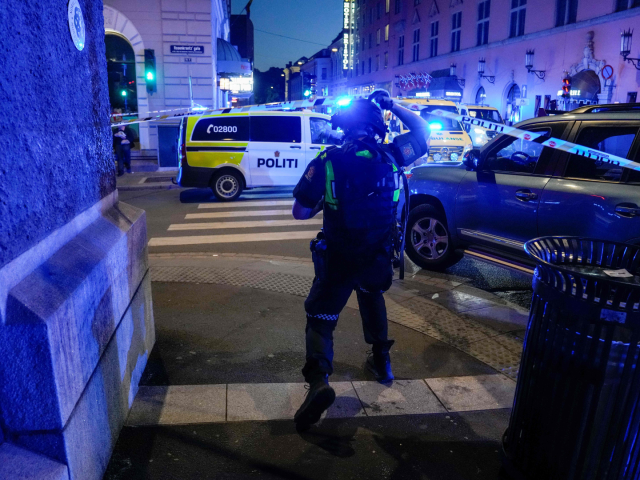
OSLO, Norway (AP) – A gunman opened fire in Oslo’s night-life district early Saturday, killing two people and leaving 10 seriously wounded in what police are investigating as a possible terrorist attack during the Norwegian capital’s annual Pride festival.
Update 1400: The Norwegian security service PST has raised its terror alert to the highest level after a mass shooting left 2 people dead and many wounded during Pride week in Oslo. Acting PST chief Roger Berg called the shootings an “extreme Islamist terror act.” He said the gunman, who was arrested shortly after the shootings, had a “long history of violence and threats.”
Investigators said the suspect, identified as a 42-year-old Norwegian citizen originally from Iran, was arrested after opening fire at three locations in downtown Oslo.
While the motive was unclear, organizers of Oslo Pride canceled a parade that was set for Saturday as the highlight of a weeklong festival. One of the shootings happened outside the London Pub, a bar popular with the city’s LGBTQ community, just hours before the parade was set to begin.
Police attorney Christian Hatlo said the suspect was being held on suspicion of murder, attempted murder and terrorism, based on the number of people targeted at multiple locations.
“Our overall assessment is that there are grounds to believe that he wanted to cause grave fear in the population,” Hatlo said.
Hatlo said the suspect´s mental health was also being investigated.
“We need to go through his medical history, if he has any. It´s not something that we´re aware of now,” he said.
The shootings happened around 1 a.m. local time, sending panicked revelers fleeing into the streets or trying to hide from the gunman.
Olav Roenneberg, a journalist from Norwegian public broadcaster NRK, said he witnessed the shooting.
“I saw a man arrive at the site with a bag. He picked up a weapon and started shooting,” Roenneberg told NRK. “First I thought it was an air gun. Then the glass of the bar next door was shattered and I understood I had to run for cover.”
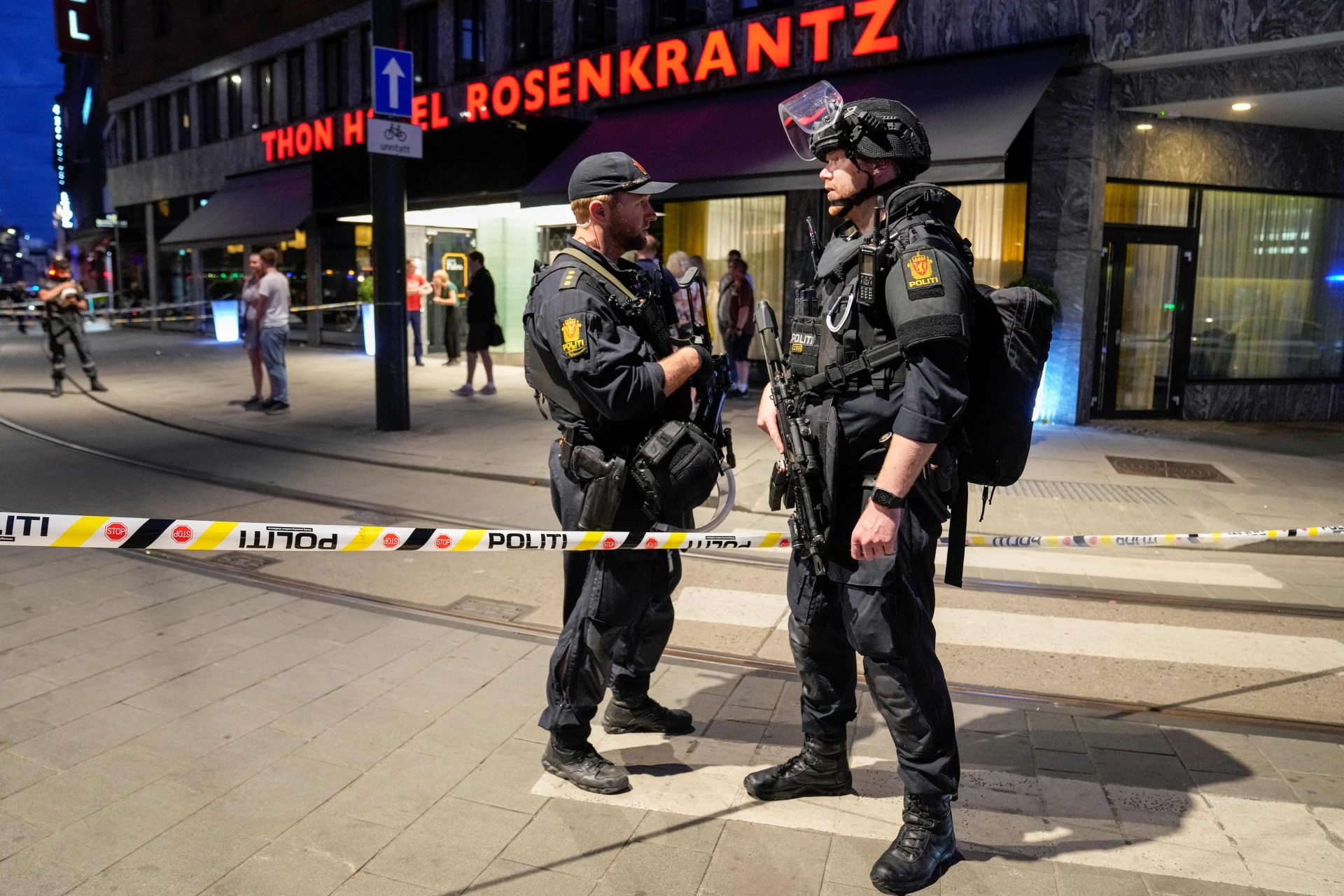
Police secure the area after a shooting in Oslo on June 25, 2022. – Two people were killed and several others seriously wounded in a shooting in central Oslo, Norwegian police said on June 25. – Norway OUT (Photo by Javad PARSA / NTB / AFP) / Norway OUT (Photo by JAVAD PARSA/NTB/AFP via Getty Images)
Police secure the area after a shooting in Oslo on June 25, 2022. – Two people were killed and several others seriously wounded in a shooting in central Oslo, Norwegian police said on June 25. – Norway OUT (Photo by Javad PARSA / NTB / AFP) / Norway OUT (Photo by JAVAD PARSA/NTB/AFP via Getty Images)
Police inspector Tore Soldal said two of the shooting victims died and 10 people were being treated for serious injuries, but none of them was believed to be life-threatening.
Prime Minister Jonas Gahr Stoere said in a Facebook post that “the shooting outside London Pub in Oslo tonight was a cruel and deeply shocking attack on innocent people.”
He said that while the motive was unclear, the shooting had caused fear and grief in the LGBTQ community.
“We all stand by you,” Gahr Stoere wrote.
Christian Bredeli, who was at the bar, told Norwegian newspaper VG that he hid on the fourth floor with a group of about 10 people until he was told it was safe to come out.
“Many were fearing for their lives,” he said. “On our way out we saw several injured people, so we understood that something serious had happened.”
Norwegian broadcaster TV2 showed footage of people running down Oslo streets in panic as shots rang out in the background.
Investigators said the suspect was known to police, as well as to Norway’s security police, but not for any major violent crimes. His criminal record included a narcotics offense and a weapons offense for carrying a knife, Hatlo said.
Hatlo said police seized two weapons after the attack: a handgun and an automatic weapon, both of which he described as “not modern” without giving details.
He said the suspect had not made any statement to the police and was in contact with a defense lawyer.
Hatlo said it was too early to say whether the gunman specifically targeted members of the LGBTQ community.
“We have to look closer at that, we don’t know yet,” he said.
Still, police advised organizers of the Pride festival to cancel the parade Saturday.
“Oslo Pride therefore urges everyone who planned to participate or watch the parade to not show up. All events in connection with Oslo Prides are canceled,” organizers said on the official Facebook page of the event.
Norway has a relatively low crime rate but has experienced violent attacks by right-wing extremists, including one of the worst mass shootings in Europe in 2011, when a gunman killed 69 people on the island of Utoya after setting off a bomb in Oslo that left eight dead.
In 2019, another right-wing extremist killed his stepsister and then opened fire in a mosque but was overpowered before anyone there was injured.
Follow Breitbart London on Facebook: Breitbart London
Pictures: 18 Dead as 2,000 African Migrants Storm Spanish Enclave
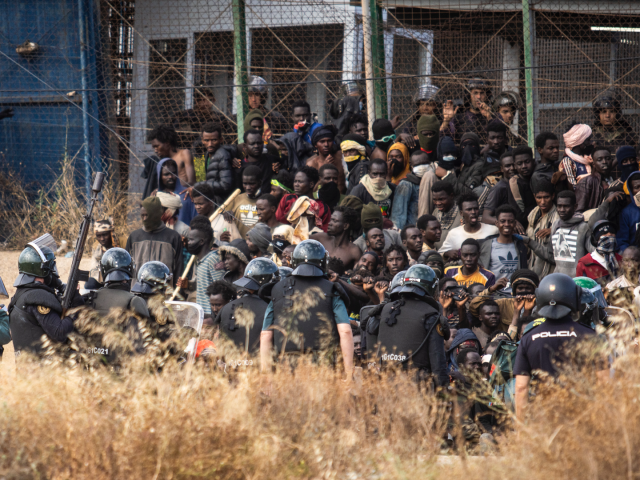
(AFP) — The Spanish prime minister on Saturday described a deadly migrant rush on the enclave of Melilla from Morocco as an attack on Spain’s “territorial integrity”, as human rights activists demanded an investigation.
At least 18 African migrants died in the latest drama on the doors of the European Union, when around 2,000 mostly sub-Saharan African migrants approached the Moroccan border with the tiny territory at dawn on Friday.
More than 500 managed to enter a border control area after cutting a fence with shears, Melilla authorities said in a statement.
Moroccan officials said late Friday that 13 migrants had died of injuries sustained in the incursion, in addition to five confirmed dead earlier in the day.
“Some fell from the top of the barrier” separating the two sides, a Moroccan official said.
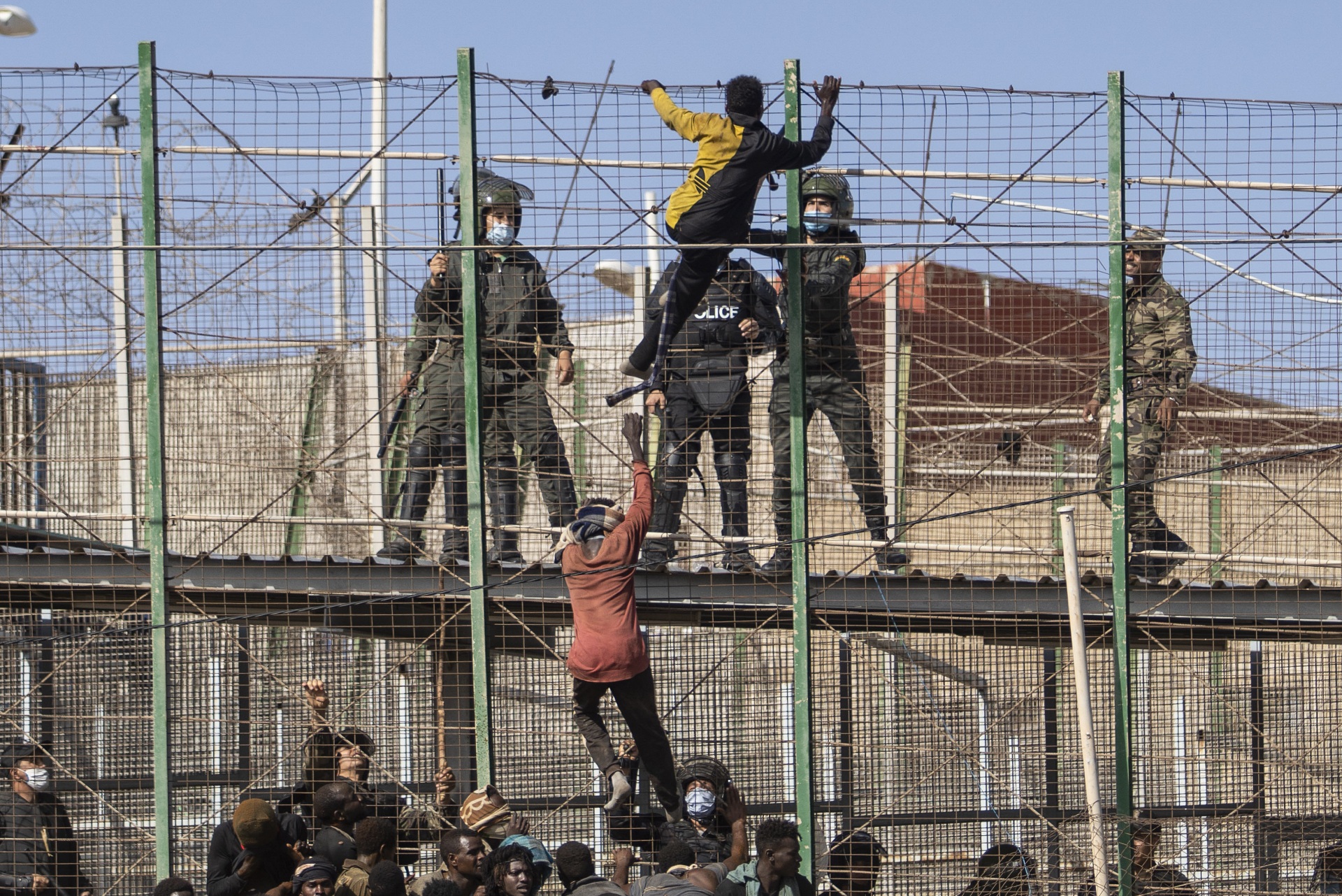
Migrants climb the fences separating the Spanish enclave of Melilla from Morocco in Melilla, Spain, Friday, June 24, 2022. Dozens of migrants stormed the border crossing between Morocco and the Spanish enclave city of Melilla on Friday in what is the first such incursion since Spain and Morocco mended diplomatic relations last month. (AP Photo/Javier Bernardo)
Prime Minister Pedro Sanchez told journalists in Madrid that “if anyone is responsible for everything that happened at the border, it is the mafias that traffic in human beings.”
But Morocco’s AMDH human rights group said it was “a true catastrophe that shows the consequences of the latest Moroccan-Spanish entente”, just weeks after the two sides resolved a year-long diplomatic rift.
On Saturday, calm returned to the border area, with Moroccan security forces lightly deployed along the frontier.
In a forested area where migrants have been camping out for years, none were to be seen.
Mohamed Amine Abidar of the AMDH said migrants, who are often rounded up by authorities and taken to cities further south, had “probably moved away for fear of being displaced”.
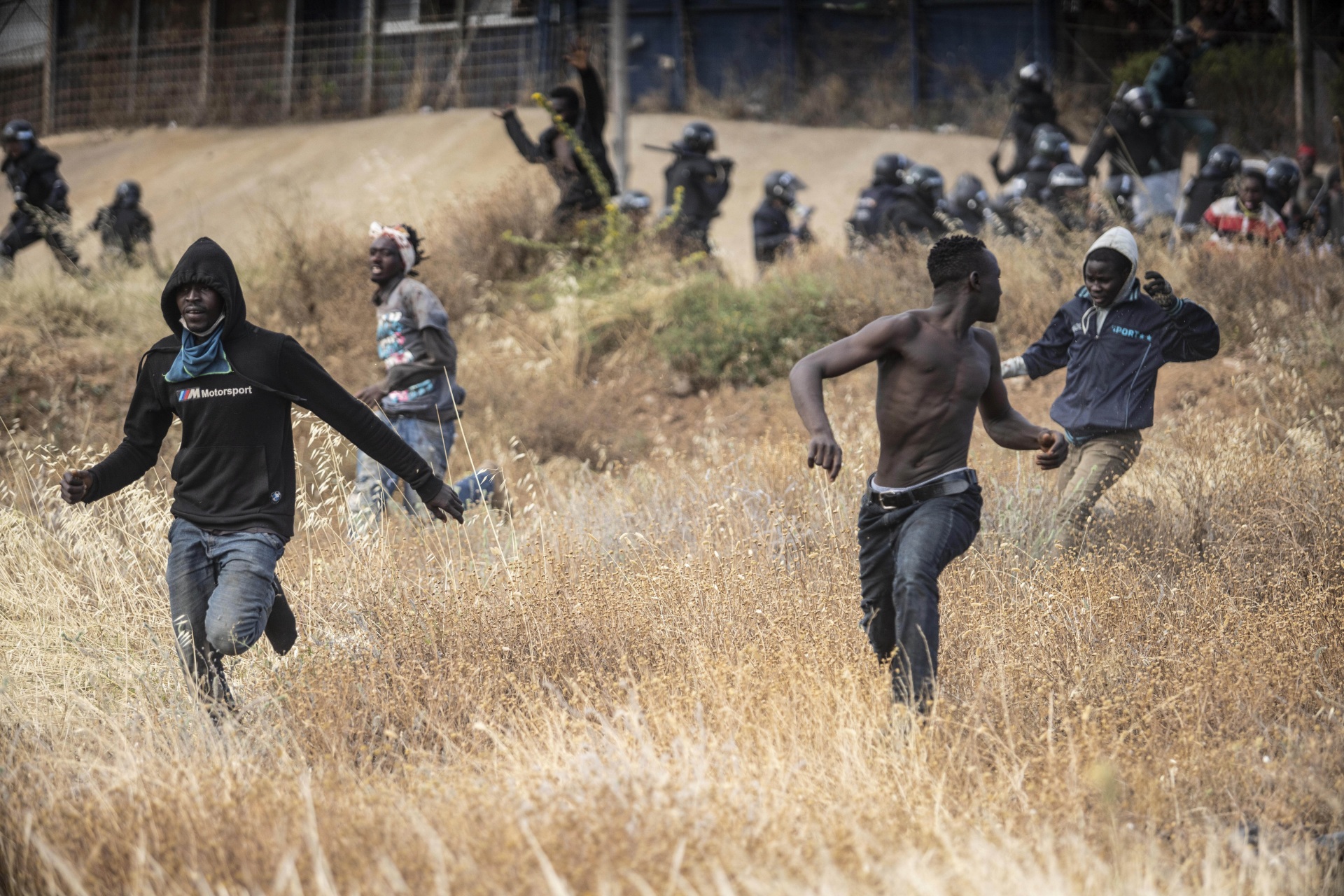
Migrants run on Spanish soil after crossing the fences separating the Spanish enclave of Melilla from Morocco in Melilla, Spain, Friday, June 24, 2022. Dozens of migrants stormed the border crossing between Morocco and the Spanish enclave city of Melilla on Friday in what is the first such incursion since Spain and Morocco mended diplomatic relations last month. (AP Photo/Javier Bernardo)
Images on Spanish media on Friday showed exhausted migrants lying on the pavement in Melilla, some with bloodied hands and torn clothes.
The AMDH demanded a “comprehensive, quick and serious enquiry to determine responsibilities and shortcomings”, and warned against burying the migrants’ bodies until their deaths had been properly investigated.
Residents of the Barrio Chino neighbourhood on the Moroccan side of the barrier said they were in shock.
“This is the most violent attempt to cross into Melilla that I’ve ever seen,” said Rachid Nejjari, a waiter in a cafe near the heavily fortified border fence.
“I saw migrants armed with sticks and iron bars… I was afraid of being attacked.”
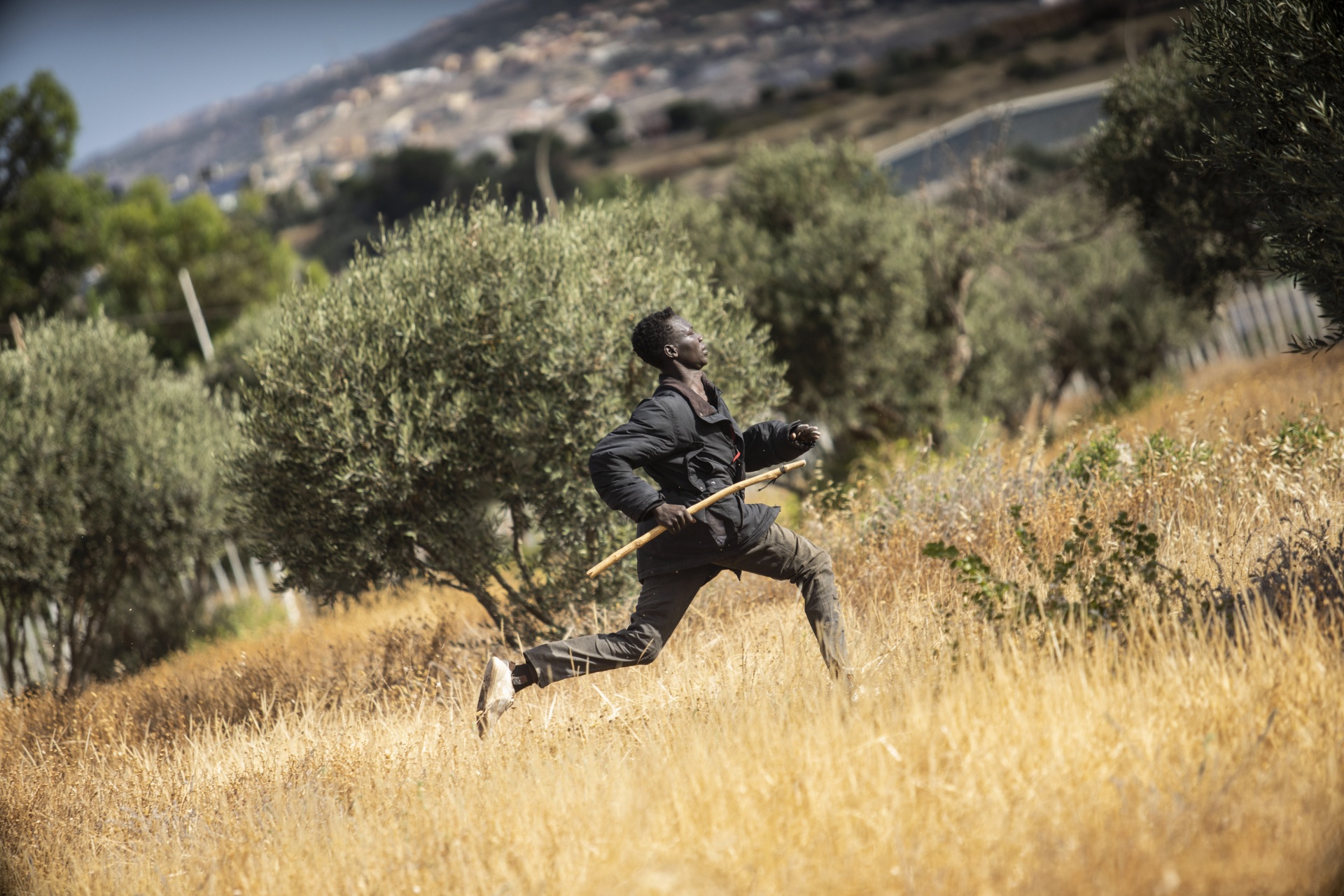
A migrant runs on Spanish soil after crossing the fences separating the Spanish enclave of Melilla from Morocco in Melilla, Spain, Friday, June 24, 2022. Dozens of migrants stormed the border crossing between Morocco and the Spanish enclave city of Melilla on Friday in what is the first such incursion since Spain and Morocco mended diplomatic relations last month. (AP Photo/Javier Bernardo)
Melilla and Ceuta, Spain’s other North African enclave, have the European Union’s only land borders on the African continent, making them a magnet for migrants.
Friday’s was the first such mass incursion since Spain mended a year-long rift by backing Morocco’s autonomy plan for the disputed Western Sahara region, scrapping its decades-long stance of neutrality.
Sanchez then visited Rabat, and the two governments hailed a “new stage” in relations.
The row had begun when Madrid allowed Brahim Ghali, leader of Western Sahara’s pro-independence Polisario Front, to be treated for Covid-19 in a Spanish hospital in April 2021.
A month later, some 10,000 migrants surged across the Moroccan border into Spain’s Ceuta enclave as border guards looked the other way, in what was widely seen as a punitive gesture by Rabat.
Rabat wants Western Sahara to have autonomous status under Moroccan sovereignty but the Polisario Front insists on a UN-supervised referendum on self-determination as agreed in a 1991 ceasefire deal.
In the days just before Morocco and Spain patched up their ties, there were several attempted mass crossings of migrants into Melilla, including one involving 2,500 people, the largest such attempt on record. Nearly 500 made it across.
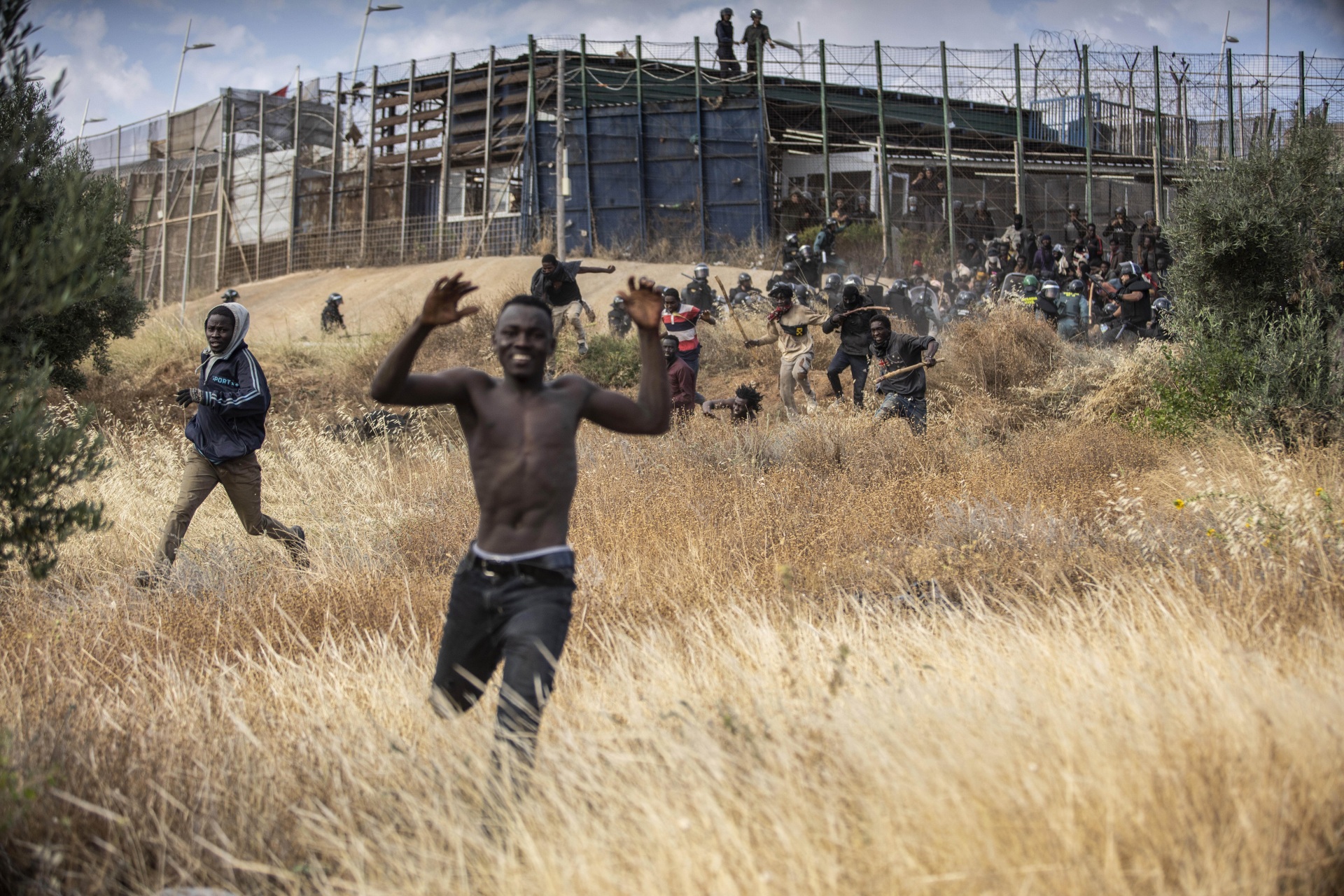
Migrants run on Spanish soil after crossing the fences separating the Spanish enclave of Melilla from Morocco in Melilla, Spain, Friday, June 24, 2022. Dozens of migrants stormed the border crossing between Morocco and the Spanish enclave city of Melilla on Friday in what is the first such incursion since Spain and Morocco mended diplomatic relations last month. (AP Photo/Javier Bernardo)
The mending of ties has meant a drop in migrant arrivals in Spain, notably in the Canary Islands.
The number of migrants who reached the Canary Islands in April was 70 percent lower than in February, government figures show.
Sanchez warned earlier this month that “Spain will not tolerate any use of the tragedy of illegal immigration as a means of pressure”.
Spain will seek to have “irregular migration” listed as one of the security threats on the NATO’s southern flank when the alliance gathers for a summit in Madrid on June 29-30.
Over the years, thousands of migrants have attempted to gain entry to the Spanish enclaves by climbing the barriers, swimming along the coast or hiding in vehicles.
The two territories are protected by fences fortified with barbed wire, video cameras and watchtowers.
Follow Breitbart London on Facebook: Breitbart London
Over Six in Ten French Say Country has Seen Too Much Immigration
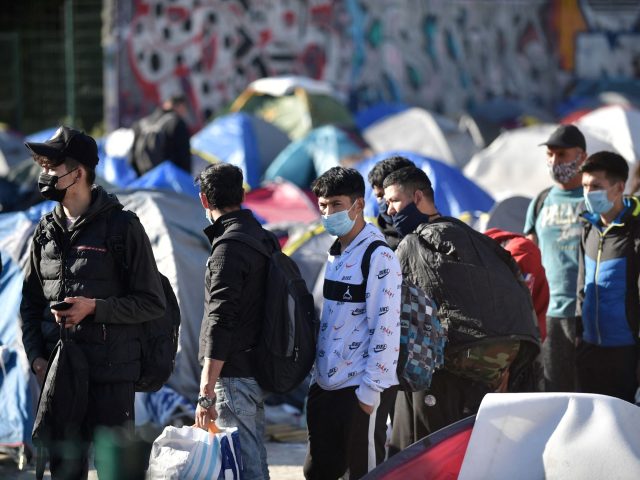
A poll released this week has revealed that 65 per cent of the French public believe that the country has seen too much immigration, with older French far more concerned with the issue.
The poll, which was conducted by the CSA Institute, revealed that 65 per cent of French people overall say that the country has seen too much immigration with a small minority claiming that France has not seen enough immigration.
When broken down by age, only those in the 18 to 24-year-old demographic thought France had not seen enough immigration at 60 per cent, while 72 per cent of people 50 to 64 think France has seen too much immigration, broadcaster CNews, which sponsored the survey, reports.
Politically, those on the right are far more concerned about immigration than left-wing parties, however, among supporters of the far-left La France Insoumise party, just 51 per cent said that there had not been enough immigration into France, while the number was much higher among other left-wing parties.
Concerns over immigration may have played a role in the massive gains seen by Marine Le Pen’s National Rally (RN) at the parliamentary elections last weekend as Ms Le Pen campaigned on the issue and had previously promised a referendum on immigration during her campaign for the French presidency.
The RN election performance, which turned eight seats won in 2017 into 89 seats last Sunday, has made Le Pen’s party into a major player in the French parliament as President Emmanuel Macron’s bloc was unable to secure a majority.
Le Pen has since announced she will step down as the president of her party to focus on leading her group in parliament, likely to be the largest after the Macron bloc as the leftist NUPES coalition has so far refused to form a single bloc in parliament.
Speaking after the election result, Le Pen highlighted immigration saying, “It is true that we were pleasantly surprised by the mobilisation of our compatriots and by this wish that immigration, insecurity, the fight against Islamism do not disappear from the National Assembly.”
French Jews Fear For Their Safety the Most in Europe: Survey
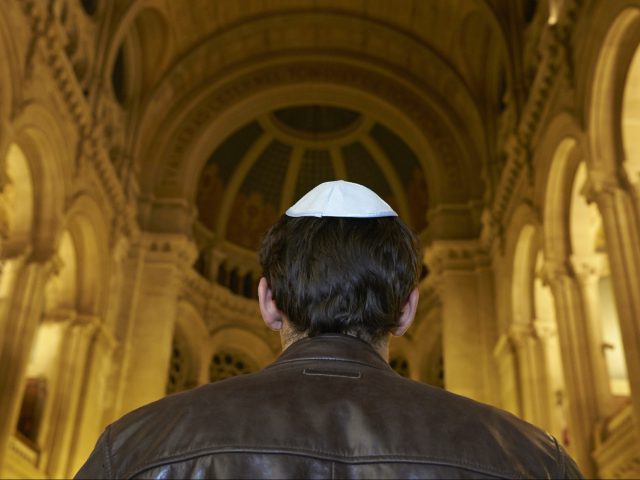
A study of the Jewish populations in twelve European countries found that Jews living in France were the most fearful for their own safety, mostly due to anti-semitic terrorist attacks in recent years.
The European Jewish Association (EJA) released the data earlier this week, which compiled a “Jewish Quality of Life” index using data gathered by the Institute for Jewish Policy Research in London and the European Union Agency for Fundamental Rights regarding key issues for Jews in Europe.
According to the index, French Jews claim they feel the least safe in their country. In contrast, Jews in Denmark felt the safest, with Daniel Staetsky, the author of the index, citing anti-semitic terrorist attacks in France as a possible reason for the feelings of insecurity, broadcaster CNews reports.
France, which has the largest population of Jews in the European Union, ranked 10th out of 12 in the index overall, which covered security of Jews, government attitude toward Jews, freedom of worship and other issues relating to the security of religious sites.
Italy was ranked first in the index with a score of 79 out of a hundred, while Hungary came in second place, despite the country being ranked first on anti-semitism.
Insecurity among the Jewish community in France is a trend that has been reported on for years as members of France’s Jewish community have fled areas like the suburbs of Paris due to high levels of anti-semitism.
Rabbi Moshe Lewin commented on the situation for Jewish people in the Paris suburbs of Seine-Saint-Denis in 2017 saying, “What upsets me is that in some areas of France, Jews can no longer live peacefully, and that just five minutes from my home, some are forced to hide their kippas (skullcaps) or their Star of David.”
Earlier this year, a survey commissioned by the American Jewish Committee and the Foundation for Policy Innovation found that nearly half of the Jews in France instruct their children to hide their Jewish faith to avoid insults and possible violence as at least 60 per cent of Jewish parents reported their children had been subjected to anti-semitism in school.

No comments:
Post a Comment